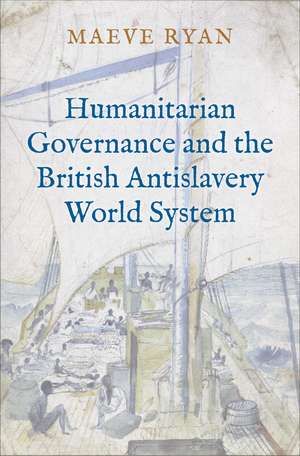Humanitarian Governance and the British Antislavery World System
Autor Maeve Ryanen Limba Engleză Hardback – 6 iun 2022
Between 1808 and 1867, the British navy’s Atlantic squadrons seized nearly two thousand slave ships, “re-capturing” almost two hundred thousand enslaved people and resettling them as liberated Africans across sites from Sierra Leone and Cape Colony to the West Indies, Brazil, Cuba, and beyond. In this wide-ranging study, Maeve Ryan explores the set of imperial experiments that took shape as British authorities sought to order and instrumentalise the liberated Africans, and examines the dual discourses of compassion and control that evolved around a people expected to repay the debt of their salvation. Ryan traces the ideas that shaped “disposal” policies towards liberated Africans, and the forms of resistance and accommodation that characterized their responses. This book demonstrates the impact of interventionist experiments on the lives of the liberated people, on the evolution of a British antislavery “world system,” and on the emergence of modern understandings of refuge, asylum, and humanitarian governance.
Preț: 312.91 lei
Nou
Puncte Express: 469
Preț estimativ în valută:
59.88€ • 62.14$ • 50.05£
59.88€ • 62.14$ • 50.05£
Carte disponibilă
Livrare economică 24 februarie-10 martie
Livrare express 08-14 februarie pentru 37.92 lei
Preluare comenzi: 021 569.72.76
Specificații
ISBN-13: 9780300251395
ISBN-10: 0300251394
Pagini: 328
Dimensiuni: 156 x 235 x 25 mm
Greutate: 0.59 kg
Editura: Yale University Press
Colecția Yale University Press
ISBN-10: 0300251394
Pagini: 328
Dimensiuni: 156 x 235 x 25 mm
Greutate: 0.59 kg
Editura: Yale University Press
Colecția Yale University Press
Recenzii
“Important, engaging. . . . Humanitarian Governance is fluently written and argued and builds on a wealth of archival research. . . . Ryan has provided us with an essential study.”—Hilary M. Carey, American Historical Review
“This brilliantly conceptualised book reveals the carceral origins of imperial humanitarianism. Its meticulous interpretation of the processing, exploitation, and experience of ‘Liberated Africans’ in sites across the British Empire underpins a new understanding of the coloniality of refuge and asylum today.”—Clare Anderson, University of Leicester
“This stunning book constitutes a ground-breaking addition to the literature on slavery and abolition.”—Manuel Barcia, author of The Yellow Demon of Fever
“In this erudite, original, and well-written account of the imperial origins of humanitarian governance Maeve Ryan demonstrates that the past is never past but continues into the present.”—Michael Barnett, author of Eyewitness to a Genocide
“This brilliantly conceptualised book reveals the carceral origins of imperial humanitarianism. Its meticulous interpretation of the processing, exploitation, and experience of ‘Liberated Africans’ in sites across the British Empire underpins a new understanding of the coloniality of refuge and asylum today.”—Clare Anderson, University of Leicester
“This stunning book constitutes a ground-breaking addition to the literature on slavery and abolition.”—Manuel Barcia, author of The Yellow Demon of Fever
“In this erudite, original, and well-written account of the imperial origins of humanitarian governance Maeve Ryan demonstrates that the past is never past but continues into the present.”—Michael Barnett, author of Eyewitness to a Genocide
Notă biografică
Maeve Ryan is a senior lecturer in history and grand strategy in the Department of War Studies and co-director of the Centre for Grand Strategy at King’s College London.
Descriere
How the suppression of the slave trade and the “disposal” of liberated Africans shaped the emergence of modern humanitarianism
